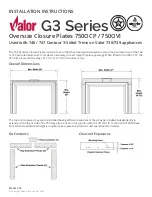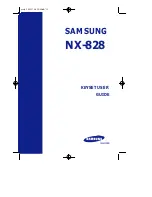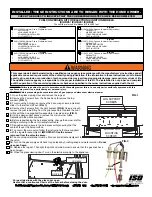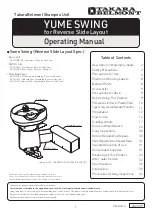
2
3
GENERAL SAFETY WARNINGS
WARNING
WHEN USING THE DUST EX-
TRACTION ATTACHMENT, BASIC
PRECAUTIONS SHOULD ALWAYS BE FOL-
LOWED, INCLUDING THE FOLLOWING: READ
THIS OPERATOR’S MANUAL, AS WELL AS YOUR
TOOL AND VACUUM OPERATOR’S MANUALS,
AND ALL LABELS ON THE ATTACHMENT, TOOL,
AND VACUUM. FOR HOUSEHOLD OR COMMER-
CIAL USE.
WORK AREA SAFETY
•
Keep work area clean and well lit.
Cluttered or dark
areas invite accidents.
•
Do not use in the presence of explosive dust,
liquids or vapors.
•
Do not use where oxygen or anesthetics are used.
•
Do not allow to be used as a toy.
Close attention is
necessary when used by or near children.
•
Use extra care when using on stairs.
ELECTRICAL SAFETY
•
Do not pick up wet material.
Do not use water to
settle dust.
PERSONAL SAFETY
•
STAY ALERT.
Watch what you are doing and use
common sense. Do not use dust extractor when you
are tired, distracted or under the influence of drugs,
alcohol or medication causing diminished control.
•
The operation of a dust extractor can result in for-
eign objects being blown into eyes,
which can result
in eye damage. Always wear safety goggles or glasses
with side shields when operating dust extractor.
• Wear a dust mask or use an OSHA compliant dust
extraction solution
when working in dusty situations.
Dust particles can harm your lungs
.
•
Do not overreach. Keep proper footing and balance
at all times.
This enables better control of the dust
extractor in unexpected situations.
•
Keep hair, loose clothing, fingers, and all parts of
body away from openings and moving parts.
•
Use only as described in this manual.
Use only
manufacturer’s recommended attachments.
USE AND CARE
•
Do not use to pick up flammable or combustible
liquids
such as gasoline or use in areas where they
may be present.
•
Do not pick up anything that is burning or smoking
such as cigarettes, matches, or hot ashes.
•
Do not pick up soot, cement, plaster or drywall
dust without filter in place.
These are very fine
particles that may affect the performance of the motor
or be exhausted back into the air.
•
This product is suitable for collection of silica dust
when used in accordance with these instructions.
To reduce the risk of health hazards from other
vapors or dust, do not vacuum carcinogenic, toxic
or hazardous materials
such as asbestos, arsenic,
barium, beryllium, lead, pesticides or other health
endangered materials.
•
WARNING:
Some dust created by power sanding,
sawing, grinding, drilling, and other construction activi-
ties contains chemicals known to cause cancer, birth
defects or other reproductive harm. Some examples
of these chemicals are:
• lead from lead-based paint
• crystalline silica from bricks and cement and other
masonry products, and
• arsenic and chromium from chemically-treated lumber.
Your risk from these exposures varies, depending on
how often you do this type of work. To reduce your
exposure to these chemicals: work in a well ventilated
area, and work with approved safety equipment, such
as those dust masks that are specially designed to
filter out microscopic particles.
•
Do not put any object into openings.
Do not use
with any opening blocked; keep free of dust, lint, hair,
and anything else that may reduce air flow.
•
Maintain dust extractor. Check for misalignment
or binding of moving parts, breakage of parts
and any other condition that may affect the dust
extractor's operation. If damaged, have the dust
extractor repaired before use.
Many accidents are
caused by poorly maintained tools.
•
Maintain labels and nameplates.
These carry im-
portant information. If unreadable or missing, contact
a
MILWAUKEE service facility for a free replacement.
SERVICE
•
Have your power tool serviced by a qualified repair
person using only identical replacement parts.
This will ensure that the safety of the power tool is
maintained.
SPECIFIC SAFETY RULES
•The Dry Coring Dust Extraction Attachment is
compliant with Table 1 of OSHA Standard 29CRF
1926.1153 assuming (1) it is used in accordance with
MILWAUKEE instructions and (2) it is attached to a
dust collector that has a filter with 99% or greater
efficiency and a filter-cleaning mechanism. Please
reference https://www.osha.gov for further details
on compliance methods.
•Before using the dust extraction attachment, read
this operator’s manual, your tool and vacuum
manuals, and all labels on the attachment, tool,
and vacuum.
• Wear ear protectors.
Exposure to noise can cause
hearing loss.
• Hold power tool by insulated gripping surfaces,
when performing an operation where the fastener
may contact hidden wiring.
Fasteners contacting a
“live” wire may make exposed metal parts of the power
tool “live” and could give the operator an electric shock.
READ AND SAVE ALL
INSTRUCTIONS
FOR FUTURE USE
SPECIFICATIONS
Cat. No. .................................................... 5319-DE
Vacuum Port Outer Diameter ......................1-7/16"
Vacuum Port Inner Diameter
.........................1-1/4"
Adaptor Outer Diameter ................................1-3/4"
Adaptor Inner Diameter
.................................1-1/2"
Bit Diameter
With Brush Rings ......................................... 1" - 5"
Without Brush Rings .................................... 5" - 6"
Type ..................................... SDS Max or Core Drill
ASSEMBLY
Connecting the Vacuum Hose
Attach the vacuum hose to the port. The hose will
clip when attached.
Installing/Removing Brush Rings
Replace the brush rings when the brushes show
signs of wear.
To remove the brush rings, pull the outer ring out of
the attachment.
To install, press the brush rings into the attachment
until it is firmly in place.
OPERATION
WARNING
To reduce the risk of fire and in
-
jury, do not use to pick up flam
-
mable or combustible materials. Empty dust box
completely before use.
To reduce the risk of injury, wear safety goggles
or glasses with side shields.
To reduce the risk of injury, wear a dust mask or
use an OSHA compliant dust extraction solution.
1.
Line up the attachment at the targeted location.
NOTE:
The drill bit may be used to aid alignment by
pushing it through the brush rings. Once the location
is set, remove the bit from the attachment.
2. Attach the vacuum hose to the dust port using the
49-90-1959 adaptor.
3. Turn on the dust extractor. Make sure the auto-
clean mode is off.
4. Push the bit through the brush rings.
NOTE:
If using a rotary hammer, make sure the drill
is in hammer-drill mode.
5. Hold the tool with both hands and start drilling.
6.
After drilling is complete, turn the dust extractor
auto-clean mode on.
7. Run the dust extractor until there is a cleaning
pulse to finish the automatic cleaning cycle.
MAINTENANCE
WARNING
To reduce the risk of injury, always
unplug the tool before performing
any maintenance. Never disassemble the tool.
Contact a MILWAUKEE service facility for ALL
repairs.
Maintaining Tools
Keep your tool in good repair by adopting a regular
maintenance program. Inspect your tool for issues
such as undue noise, misalignment or binding of
moving parts, breakage of parts, or any other condi
-
tion that may affect the tool operation. Return the tool
to a MILWAUKEE service facility for repair. After six
months to one year, depending on use, return the
tool to a MILWAUKEE service facility for inspection.
WARNING
To reduce the risk of personal in-
jury, electric shock and damage,
never immerse your tool in liquid or allow a liquid
to flow inside it.
Cleaning
Clean dust and debris from vents. Keep handles
clean, dry and free of oil or grease. Use only mild
soap and a damp cloth to clean, since certain clean-
ing agents and solvents are harmful to plastics and
other insulated parts. Some of these include gasoline,
turpentine, lacquer thinner, paint thinner, chlorinated
cleaning solvents, ammonia and household deter-
gents containing ammonia. Never use flammable or
combustible solvents around tools.
Repairs
For repairs, return the tool to the nearest service
center.
ACCESSORIES
WARNING
Use only recommended accesso-
ries. Others may be hazardous.
For a complete listing of accessories, go online to
www.milwaukeetool.com or contact a distributor.
SERVICE - UNITED STATES
1-800-SAWDUST
(1.800.729.3878)
Monday-Friday, 7:00 AM - 6:30 PM CST
or visit
www.milwaukeetool.com
Contact Corporate After Sales Service Technical
Support with technical, service/repair, or warranty
questions.
Email: [email protected]
Become a Heavy Duty Club Member at
www.milwaukeetool.com to receive important
notifications regarding your tool purchases.
SERVICE - CANADA
Milwaukee Tool (Canada) Ltd
1.800.268.4015
Monday-Friday, 7:00 AM - 4:30 PM CST
or visit www.milwaukeetool.ca























